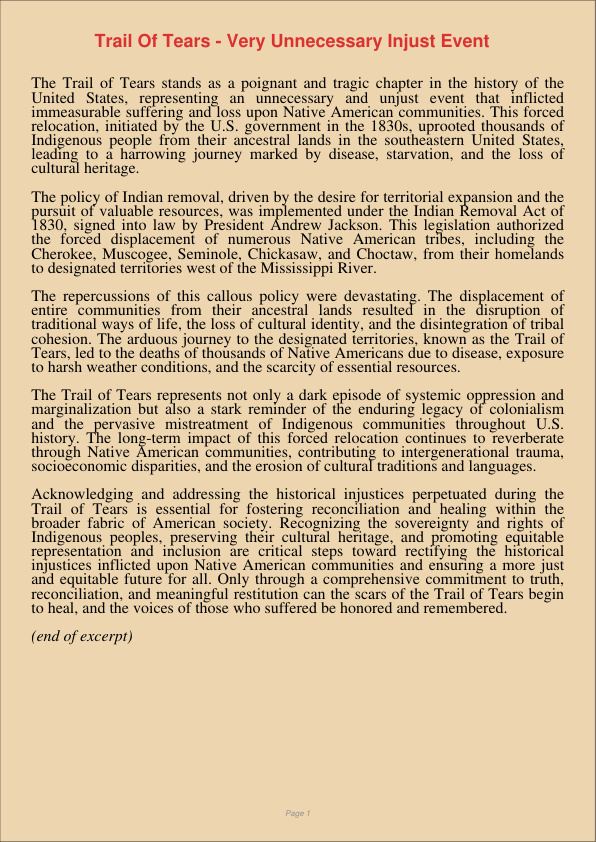Trail Of Tears Very Unnecessary Injust Event
Dec 31, 2023
unnecessary injust event
trail
Other
Health Sciences & Medicine
The Trail of Tears stands as a poignant and tragic chapter in the history of the United States, representing an unnecessary and unjust event that inflicted immeasurable suffering and loss upon Native American communities. This forced relocation, initiated by the U.S. government in the 1830s, uprooted thousands of Indigenous people from their ancestral lands in the southeastern United States, leading to a harrowing journey marked by disease, starvation, and the loss of cultural heritage.
The policy of Indian removal, driven by the desire for territorial expansion and the pursuit of valuable resources, was implemented under the Indian Removal Act of 1830, signed into law by President Andrew Jackson. This legislation authorized the forced displacement of numerous Native American tribes, including the Cherokee, Muscogee, Seminole, Chickasaw, and Choctaw, from their homelands to designated territories west of the Mississippi River.
The repercussions of this callous policy were devastating. The displacement of entire communities from their ancestral lands resulted in the disruption of traditional ways of life, the loss of cultural identity, and the disintegration of tribal cohesion. The arduous journey to the designated territories, known as the Trail of Tears, led to the deaths of thousands of Native Americans due to disease, exposure to harsh weather conditions, and the scarcity of essential resources.
The Trail of Tears represents not only a dark episode of systemic oppression and marginalization but also a stark reminder of the enduring legacy of colonialism and the pervasive mistreatment of Indigenous communities throughout U.S. history. The long-term impact of this forced relocation continues to reverberate through Native American communities, contributing to intergenerational trauma, socioeconomic disparities, and the erosion of cultural traditions and languages.
Acknowledging and addressing the historical injustices perpetuated during the Trail of Tears is essential for fostering reconciliation and healing within the broader fabric of American society. Recognizing the sovereignty and rights of Indigenous peoples, preserving their cultural heritage, and promoting equitable representation and inclusion are critical steps toward rectifying the historical injustices inflicted upon Native American communities and ensuring a more just and equitable future for all. Only through a comprehensive commitment to truth, reconciliation, and meaningful restitution can the scars of the Trail of Tears begin to heal, and the voices of those who suffered be honored and remembered.
